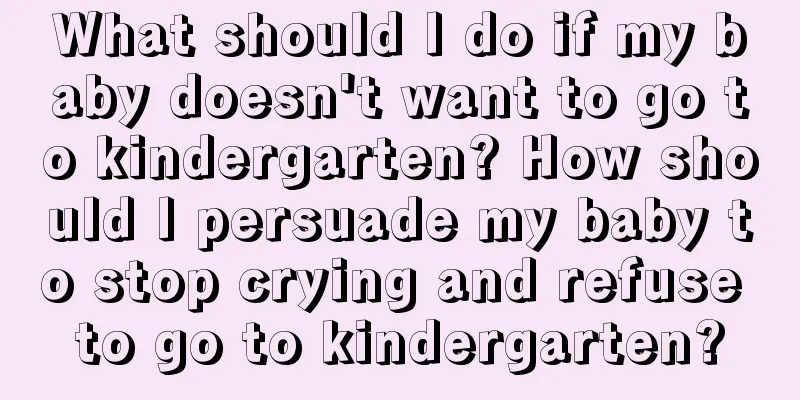What should I do if my baby doesn't want to go to kindergarten? How should I persuade my baby to stop crying and refuse to go to kindergarten?

|
What should we do if our baby refuses to go to kindergarten? The summer vacation is about to be halfway through, which makes many parents panic. In September, many children will start to go to kindergarten. Today, we will introduce to you how to persuade your baby who cries and refuses to go to kindergarten. Please see the detailed introduction below. How to persuade a baby who cries and refuses to go to kindergartenChildren love their parents the most, so they naturally want to be with them all the time. Going to kindergarten means leaving the familiar home and entering a completely unfamiliar environment, surrounded by strangers. Just imagine, even if we adults are placed in an unfamiliar environment, we will feel uneasy and want to escape, and the same is true for children. In addition, going to kindergarten means leaving parents. For young children, it is difficult to understand why they have to be separated from their parents. They may even worry that they will never see their parents again, so they will feel very uneasy. Therefore, parents must look at this issue from a different perspective. For every healthy child, it is normal to feel uneasy and cry when going to kindergarten for the first time. This is precisely the proof that he has a good relationship with his parents. Therefore, if a baby does not show any resistance to going to kindergarten when he first enters the kindergarten, it is worthy of his parents' attention. Usually, this is because parents have been forcefully instilling in their children the idea that "you must go to kindergarten" and "you must be good", so the children will reluctantly show their willingness to go to kindergarten. At this time, the child feels uneasy about going to an unfamiliar kindergarten, but cannot show it, which results in a lot of pressure. These pressures will be expressed in other forms. For example, some children say they want to go to kindergarten, but often have a sudden stomachache when they are about to go out in the morning. This is not the child pretending to be sick, but a manifestation of their stress. If children often experience these conditions, parents must pay attention to reflection. When children say "I don't want to go to kindergarten", they really don't want to go, because they are very uneasy about the unfamiliar environment and leaving their parents. When children say that, many helpless parents will respond to their children with "How can you not want to go to kindergarten?" "Kindergarten is so interesting, Dad also wants to go to kindergarten" and so on. In fact, this is a mistake of denying the child's true feelings. When a child resists going to kindergarten, the first thing we need to do is to understand and acknowledge his or her feelings, "Yes, you don't want to go to kindergarten. I know you will miss your mother." Then say something that can reassure the child: "Mom will miss you too. I will come to pick you up at ○○ o'clock, and you can be with me again." Only in this way can the child gradually feel at ease. Children are the most sensitive and observant creatures. Even if their parents’ thoughts and ideas are not expressed directly through words, children can often feel their emotions. Have you ever felt too much anxiety and uneasiness about your child going to kindergarten? “Will the kindergarten teachers be mean to my child?” “Can my child eat well by himself?” These anxieties and uneasiness will be conveyed to the child, making him feel that going to kindergarten is a terrible thing, so he will naturally resist. Many children are not "perfect" when they first go to kindergarten. Some children cannot go to the toilet by themselves, some children cannot button their clothes or put on their shoes by themselves, and some children cannot eat by themselves. Because they are worried that their children will suffer in kindergarten, mothers are often eager for their children to learn these skills. All mothers must have experienced that when you are too anxious, you will usually fail in learning. To learn something well, you must first have confidence. However, telling your child, "You can't go to kindergarten if you don't know how to eat" or "You still can't go to the toilet well, what will you do in kindergarten?" These words can't help children build confidence, but will give them the impression that "kindergarten is terrible, I can't go to kindergarten, I can't do it." If you want to build your child's self-confidence, don't look for your child's shortcomings from the perspective of the future. Instead, compare your child with his past self, find out his progress, and say to him: "You had such a great meal today, so you will definitely have no problem going to kindergarten." Parents often use "going to kindergarten" as a means of punishment without intending to do so. For example, they say: "You are so disobedient now, let the teacher take good care of you when you go to kindergarten tomorrow", "You can make trouble now, and see what you will do when you go to kindergarten", "If you don't behave again, I will send you to kindergarten tomorrow". This is equivalent to putting kindergarten in opposition to the child, making kindergarten the child's enemy, and the subtext is telling the child: "Going to kindergarten is a bad thing". In this way, the child will of course resist going to kindergarten. Correspondingly, can "not going to kindergarten" be regarded as a reward? "You behaved well today, and I agree that you don't have to go to kindergarten tomorrow." This is actually the same as "going to kindergarten" as a punishment, and both put the kindergarten in opposition to the child. But in fact, children will be very happy if they don't go to kindergarten, so how should we tell them? At this time, we should change the way of expression. You can tell the child "You behaved very well today. As a reward, you can stay at home with your mother all day tomorrow." In this way, the focus is shifted from "whether to go to kindergarten" to "whether you can be with your mother", which will not create a negative impression of kindergarten. What to do if the baby doesn't go to kindergarten1. Environmental creation method. When the child is young, take the child into the collective environment more often, so that the child can see many adults and peers at once, and let him become familiar with the concept of the collective. But the most important thing is to encourage children to contact with others under all circumstances, and don't have the mentality of "what if my child suffers?" Gudong attended early childhood education for half a year when he was about 2 years old. I had no expectations for the development that early childhood education could bring to the child. It was just that our community at that time was an old urban area, and there were basically no children of the same age, all of them were grandpas and grandmas. I just hoped that he would see more peers in the early childhood education center and let him feel the concept of a class where many people do something together. 2. Psychological construction. In fact, most children nowadays lack playmates. It is a happy thing to be able to play with playmates. Parents must describe the kindergarten from time to time when their children have been in kindergarten for one to six months. There are many children in the kindergarten, and they can play many small games together. It is really happy. Let the children be full of yearning for kindergarten life from the heart. Remember that some elderly people show a pessimistic attitude in front of children, "Play for a while, and you will be controlled when you go to kindergarten." These words and such negative emotions must never be revealed in front of children. 3. Book education. There are many good picture books that describe kindergarten life. I recommend a French picture book called "I Love Kindergarten", which describes kindergarten life from the perspective of children. The book does not avoid crying on the first day of kindergarten. From the way to kindergarten, to kindergarten life, kindergarten learning, and various teachers in kindergarten, there are interesting descriptions. After reading this book, children will know what kindergarten life is like. People are often afraid of the unknown. When they know it, they will not be afraid. 4. Parent-child games. Parents can play more "kindergarten" games with their children before they enter the kindergarten, provided that the mother is very familiar with the daily life process of the kindergarten. The mother is the teacher and the child comes to the kindergarten. "XXX, here you are. Please wash your hands, rinse your mouth, and put down the cup now." "Wash your hands like this and rinse your mouth like this." "Now it's regional activity time, what do you want to play?" "Outdoor time is here, we are going to play outside. Who wants to play the ball? Who wants to ride a car?" "It's time for lunch, today's lunch is..." .... Children will definitely enjoy playing this game. When they arrive at the kindergarten, the children will find that this is the kindergarten, and naturally they will not have fear or resistance. "Kindergarten games" can also be played after entering the kindergarten. After a period of time, the children will know more about the regular life than their parents. This time it is the turn of the children to be teachers and the parents to be students. Gudong's "kindergarten" game lasted for a semester, which almost broke the father. Why do they have to play this game every day?! Yes, this is their daily life, kindergarten is a game! 5. Communication with teachers. Every baby is unique. Parents should communicate with teachers with a humble and positive attitude. Parents should communicate with teachers about their children’s characteristics in a timely manner, such as whether their children are extroverted, slow to warm up, like to draw, etc. Parents should let teachers know in a timely manner so that teachers can communicate with their children in a timely manner and have good interactions. Common reasons for not going to kindergarten1. Kindergarten does not provide the freedom you need at home Although there are many children in kindergarten and you can play games with them, kindergarten is not as free as at home. Children have to be restrained by teachers, eat on time, and go to bed on time. They can't do whatever they want like at home. Therefore, even if they are fine after school every day, when they get up in the morning, they will still resist going to kindergarten. 2. Holiday Syndrome After the weekend or long vacation, children's resistance to going to kindergarten is more obvious. When the weekend finally comes, parents will let their children sleep late and get up late, and take them to do their favorite activities. The life order established by the children in kindergarten is completely disrupted. This kind of life is in sharp contrast with the situation at school, and children naturally don't want to be restricted. 3. Find a reason to refuse to go to kindergarten after being sick When a child is sick, parents will try to keep the child at home to recover. Not only can the child not go to kindergarten, but the child will also be taken care of by the whole family. Some parents who love their children will give up their usual principles and meet some unreasonable demands of their children. In this way, when the child recovers from the illness, he will find excuses to refuse to go to kindergarten. 4. Other reasons Failure to fulfill a promise made to other children or being criticized by teachers in kindergarten can also become excuses for children to go to kindergarten. |
<<: Which country's brand is Safeguard? Is Safeguard soap good?
>>: Vinda toilet paper product introduction Vinda toilet paper specifications and sizes
Recommend
Will breasts become deformed during breastfeeding? How to avoid breast deformation after childbirth?
In order to maintain their figure, many young mot...
Is a spoonful of baby milk powder a flat spoon or a full spoon? How many grams does a spoonful of baby milk powder weigh?
When preparing milk powder for babies, there are ...
What preparations are needed before IVF? How long does it take?
For infertile women, IVF is undoubtedly their gre...
What are the advantages and disadvantages of air fryers? Does long-term use of air fryers cause cancer?
Many families are worried that fried foods may be...
How to train your baby to fall asleep on his own? How to train your baby to sleep through the night?
The baby's sleep problems will determine the ...
What should you pay attention to during confinement in winter? Keep warm
As we all know, women are most vulnerable in the ...
Can children use Sanfutie? How old should a child be to use Sanfutie?
During the hot summer, many hospitals or health c...
How to improve your baby's emotional intelligence: 6 must-learn tips
Excellent babies need to be cultivated from an ea...
How many degrees is better to heat children's food? Over 65 degrees will damage the esophagus
Don't exceed 65 degrees, which will damage th...
Can pregnant women use a warm pack? Will it affect the baby's health?
Pregnant women have many taboos in life, so, can ...
Can I take a bath after my baby's fever subsides? What are the effects after my baby's fever subsides?
Children have poor immunity and if parents do not...
Can mothers drink formula milk? Can adults drink baby milk powder?
Formula milk is specially designed for newborns. ...
6-month-old baby development indicators 6-month-old baby development standards
When the baby is six months old, his body has gro...
What is the reason for the odor down there after childbirth? What should I do if there is an odor down there after childbirth?
It has been more than 10 days since I had a norma...
Can I do pelvic floor muscle training during menstruation? Can I do pelvic floor muscle training during menstruation after giving birth?
Many new mothers will perform pelvic floor muscle...









